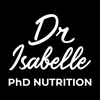ISABELLE'S OPINION:INTERMITTENT FASTING

ISABELLE'S OPINION: INTERMITTENT FASTING
The ketogenic diet and intermittent fasting have been, without a doubt, the most popular diets for two years. If I really do not recommend the ketogenic diet because of the significant restrictions that the approach imposes, the lack of variety, the unfavorable impact on the microbiota and LDL-Cholesterol, intermittent fasting seems more advantageous to me.
The literature surrounding intermittent fasting looks promising. However, for the moment, the majority of the results obtained are mainly based on studies in rodents or on very specific populations, such as among Muslims during Ramadan. These contexts therefore do not allow the results to be extrapolated to the general population. In the context of long-term weight loss (12 months and more), we do not see a greater effect than that which could be obtained with more standard calorie restriction. However, for some people, it is easier to reduce the amount of calories ingested if they are concentrated in a more limited time window, as is the case with the popular 16-8, for example. A person on a 16-8 type fast will eat for 8 hours and fast for 16 hours. In this case, many choose to eat from 12 p.m. to 8 p.m., for example. In people who are not hungry in the morning or in those who tend to snack in the evening, the results could be interesting. The daily caloric balance is negative, which causes weight loss.
Note that fasting is not recommended for people with eating disorders, pregnant women or diabetics who are taking medication that can induce hypoglycemia.
If you want to incorporate this approach into your lifestyle, make sure it doesn't harm your relationship with food. If you experience a feeling of deprivation while fasting and this causes you to eat beyond your satiety signals afterwards, this strategy is not for you. I also recommend that those who wish to integrate this approach do so with the support of a nutritionist. It remains important to optimize intake during the food intake period to ensure that nutritional needs are met. Those who limit food intake to one meal cannot meet their nutritional needs.
Finally, although the 16-8 is more popular, it is also possible to fast for a period of 24 hours and more, and to combine these fasting days with normal eating days. I don't agree with this version. Indeed, the latter seems much more difficult to me and risks affecting the social life of the person who is fasting.e.
Bonjour,
J aimerais faire le jeune mais ma question est puis je boire un café avec lait 0% en me levant le matin et ensuite m alimenter vers 12h pour ensuite terminer vers 20h. Le fait de boire pendant le jeûne va t il nuire?
Moi j’ai fait le jeûne de 36 heures pendant 4 mois (janvier à mai 2021) et ce, 2 fois/semaine) et j’ai perdu 30 livres. C’était mon objectif. Depuis mai 2021, je fais le jeûne de 24 heures (2 fois/semaine) et je me porte très bien. J’ai beaucoup plus d’énergie qu’avant et je n’ ai jamais été aussi en forme.
Je fais Lejeune intermittent 8/16 je n’ai pas de problême avec les heures de jeûne mai je ne sais pas quoi manger pour avoir des repas équilibrés.Merci de me lire
Bonne lecture, merci! Je songe à essayer le jeûne intermittent… mais ça me stresse un peu car pour moi le meilleur repas, c’est le petit déjeuner. Et j’ai faim en me levant… Alors je vais me conditionner et prendre mon souper un peu plus tôt pour ne pas avoir à attendre trop longtemps pour manger le matin. À suivre 😉
@Fabienne : Bonjour Fabienne, c’est un mode de vie, on doit le faire chaque jour!











35 comments